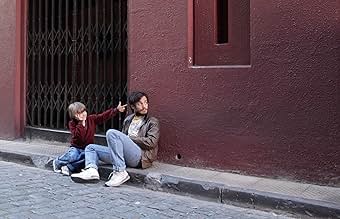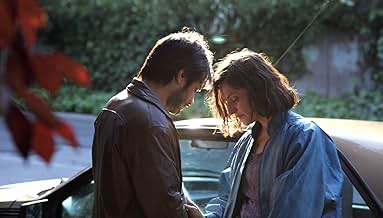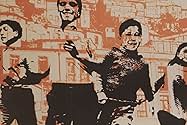Un responsable de la publicité propose une campagne pour vaincre Augusto Pinochet lors du référendum de 1988 au Chili.Un responsable de la publicité propose une campagne pour vaincre Augusto Pinochet lors du référendum de 1988 au Chili.Un responsable de la publicité propose une campagne pour vaincre Augusto Pinochet lors du référendum de 1988 au Chili.
- Nommé pour 1 oscar
- 15 victoires et 28 nominations au total
Histoire
Le saviez-vous
- AnecdotesSeveral people from the actual "No" campaign in Chile were hired to play members of the "Yes" campaign in the film.
- GaffesToutes les informations contiennent des divulgâcheurs
- Citations
Publicista Campaña Sí: [Speaking to the YES Campaign board] If you want to scare people, you have to scare them with their past, their past poverty, long lines to buy bread. The opposition has its cries of socialism, yes. But the only thing that interests people is the scramble, and also they know that socialism is miserable. Instead you have a system in which anyone can be rich. Attention!, not 'everyone'... 'anyone'. You can not lose when all are committed to be that 'anyone'.
- Générique farfeluThe opening and closing credits all feature easel paper pads with prologue, title and ending credit roll call, showing a person's hands flipping over each page.
- ConnexionsFeatured in Chelsea Lately: Episode #7.9 (2013)
- Bandes originalesLa alegria ya viene
Written by Sergio Bravo & Jaime de Aguirre
No is one of those films which I wasn't looking forward to seeing because I just wasn't interested in the subject matter. I'm not into historical political movies, but this film was much more than that. No works more as a media satire than an actual political movie. The satire works really well and it reminds us of how important the media can be in our society. No should be required viewing for all advertising students in schools around the globe. The film works in great part thanks to Gael Garcia Bernal's performance as the ad executive who comes up with the campaign for No in the referendum. Bernal has proved in the past that he's a very reliable actor, and one of the best in Latin America. The film also has great direction from Pablo Larraín, who decided to shoot the film using U-matic video tape to give it a more 80's vibe since that was the type of video which was used then. That brought a sense of realism to the movie, and at times it felt like a documentary. This was a well crafted film, and a decent contender for best foreign film of the year. It lost to Amour in the Oscars, but received a lot of love in the Cannes Festival last year. The screenplay was very well adapted by Pedro Peirano (who also wrote the screenplay for 2009's The Maid, a well received Chilean film) from Antonio Skarmeta's (famous for his novel Il Postino) play. This is one art house film you won't regret watching.
It's the end of the 80's and Chilean dictator, Augusto Pinochet, has called for a national referendum after being pressured by international organisms. After 15 years of dictatorship, Pinochet is allowing the country to vote Yes or No to him extending his rule for 8 more years in the country. Everyone is convinced that this is all a farce and just a means for Pinochet to legalize his authority. Pinochet is also convinced he will win the elections considering that he has brought economic stability to the country. For 27 days both parties will be allowed to have a 15 minute spot of uninterrupted television air time in which they can campaign. This is where the young ad executive known as Rene Saavedra (Gael Garcia Bernal) comes to play. The No coalition decides to hire him to lead their campaign, but what they don't realize is that he will bring a unique approach to the campaign. Since Pinochet's dictatorship was known for its brutal intimidation and censorship, everyone in the No coalition expects to make their voice heard and focus on the violence and brutality of his government, but Saavedra has a different view: He wants to make a joyful, colorful, and upbeat campaign where the primary message is that ¨Chile: happiness is coming.¨ Everyone in the campaign is upset about this, including Saavedra's ex wife, Veronika (Antonia Zegers), who thinks all this is just a waste of time. However, the campaign begins resonating with voters, and Pinochet's people decide to hire Saavedra's boss, Lucho Guzman (Alfredo Castro), to counteract the comedic and joyful campaign. Things won't be easy for the No coalition because the government begins intimidating and pressuring them through violence, but Saavedra knows that his campaign can change the course of the country for the better.
Advertising is a powerful weapon in today's world, and more than ever we see governments trying to control and censor the media. The reason being that they know that it can shift elections and bring down tyrannical leaders. That is why more than ever, we must fight to keep governments from trying to control or censor the media. What a lot of politics have done is use advertising wisely to get elected. The film is a great case study on politics and media and how they are correlated. No is a film everyone involved in media and politics should see because it shows the advantages and disadvantages that this medium has. Pablo Larrain has directed a powerful film which teaches us how the media can influence public opinion so easily. If only we could have more uplifting and joyful political campaigns like this I would be much more interested in voting. I vote yes: go see this movie.
http://estebueno10.blogspot.com/
- estebangonzalez10
- 7 mai 2013
- Lien permanent
Meilleurs choix
Détails
- Date de sortie
- Pays d’origine
- Sites officiels
- Langue
- Aussi connu sous le nom de
- Нi
- Lieux de tournage
- sociétés de production
- Consultez plus de crédits d'entreprise sur IMDbPro
Box-office
- Brut – États-Unis et Canada
- 2 343 664 $ US
- Fin de semaine d'ouverture – États-Unis et Canada
- 71 742 $ US
- 17 févr. 2013
- Brut – à l'échelle mondiale
- 7 699 095 $ US
- Durée1 heure 58 minutes
- Couleur
- Mixage
- Rapport de forme
- 1.40 : 1
Contribuer à cette page


![Regarder Tráiler [OV]](https://m.media-amazon.com/images/M/MV5BODAzODZiZjEtNWY5Zi00NDU3LWI1NzEtNGZlNDk2YjBlMzkwXkEyXkFqcGdeQXRodW1ibmFpbC1pbml0aWFsaXplcg@@._V1_QL75_UY281_CR7)




































